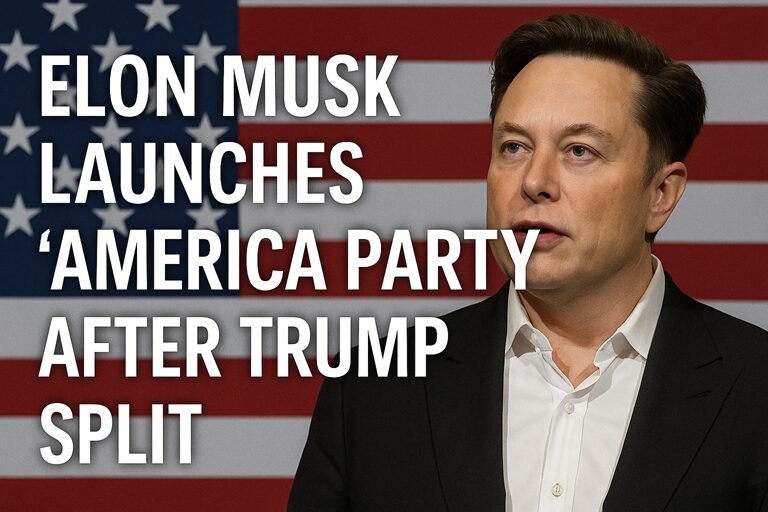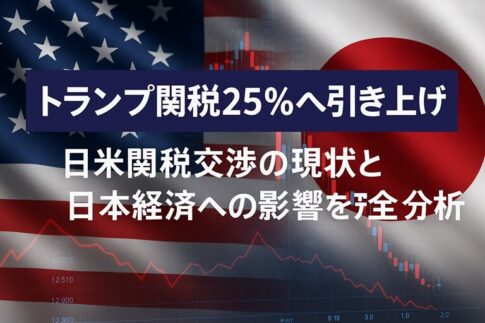目次
- 1 Elon Musk Launches ‘America Party’ After Trump Split
- 1.1 Musk’s Path to New Party Formation – Background of Political Transformation
- 1.2 From Honeymoon to Break with Trump Administration – 130 Days of Dramatic Reversal
- 1.3 Details and Impact of the Massive Tax Cut and Spending Bill
- 1.4 Severe Impact on Tesla Stock and Business Damage
- 1.5 Details of “The America Party” Formation and Future Prospects
- 1.6 Digital Platform Power and the Transformation of State Roles
- 1.7 Musk’s International Influence and Geopolitical Impact
- 1.8 Trump and Musk – Commonalities and Differences Between Two “Disruptors”
- 1.9 Political Struggle in the SNS Era – X as a Weapon
- 1.10 “Informational Health” and the Future of Democracy
- 1.11 Future Outlook – Deep Calculation or Impromptu Performance?
- 1.12 Conclusion – The New Relationship Between Tech Giants and States
Elon Musk Launches ‘America Party’ After Trump Split
On July 5, 2025, Tesla CEO Elon Musk announced the formation of a new political party, “The America Party,” on X (formerly Twitter). “Today, The America Party was formed to take back your freedom,” his words marked a direct challenge to America’s two-party system. Behind this shocking announcement lies a decisive break with his former ally, President Donald Trump, signaling the emergence of new power structures in American politics.
Musk’s Path to New Party Formation – Background of Political Transformation
The immediate trigger for Musk’s new party announcement was his strong dissatisfaction with the massive tax cut and spending bill passed by the Trump administration through Congress. For weeks, Musk had expressed this bill on X as “disgusting ugliness” and “abhorrent monster,” launching fierce criticism.
• “Further increases the already massive budget deficit”
• “Congress is bankrupting America”
• “Massive, outrageous, pork-barrel congressional spending bill”
• “Those who voted for it should be ashamed. They know they did wrong”
Musk also declared he would strengthen political donations to defeat lawmakers who voted for the bill in the midterm elections. He stated, “In terms of bankrupting the country with waste and corruption, we are living in a one-party system, not a democracy,” expressing fundamental distrust in the existing political system.
Evolution of Political Stance
Musk’s political position has changed significantly over time. Previously known as a Democratic supporter, he revealed voting for Barack Obama in the 2008 and 2012 presidential elections, Hillary Clinton in 2016, and Joe Biden in 2020.
However, in March 2024, he posted on X: “Until a few years ago, I voted 100% Democrat, but now we need a Republican wave. Otherwise, America is finished,” clearly marking his political transformation. His political stance is described as “libertarian respecting individual freedom,” more specifically as a “techno-libertarian” aiming to expand the realm of freedom through technology.
The following factors are cited as background for this transformation:
- Strong opposition to behavioral restrictions during the COVID-19 pandemic (criticized California’s factory closure as “fascist”)
- Criticism of the Democratic Party’s tolerant attitude toward labor unions
- Dissatisfaction with immigration policies
- Aversion to Democratic left-wing thinking related to his child being transgender
Interestingly, there are many inconsistencies in Musk’s public statements and tweets on X. For example, while fiercely criticizing federal subsidy systems, his companies have received billions of dollars in benefits through federal tax incentives and other incentives.
From Honeymoon to Break with Trump Administration – 130 Days of Dramatic Reversal
From Largest Individual Donor to Administration Executive
Musk became Trump’s largest individual donor in the 2024 U.S. presidential election, contributing a total of $274 million. On July 13, 2024, immediately after Trump was shot in Pennsylvania, Musk officially announced his support for Trump on X, praising him as “the most resilient candidate since President Theodore Roosevelt.”
After the election, Musk was appointed as the de facto head of the Trump administration’s “Department of Government Efficiency” (DOGE). The acronym DOGE is said to be taken from the Shiba Inu-themed cryptocurrency “Dogecoin.”
• Reduction of federal government waste (target of $500 billion annually, up to $2 trillion)
• Reduction of federal employees
• Promotion of deregulation
• Cuts to foreign aid and scholarship programs
• Radical goal to “eradicate Washington bureaucrats”
Musk repeatedly argued that government was hindering innovation and believed deregulation was essential for industrial development. His activities at DOGE were described as a “role hated by the people,” but Musk energetically fulfilled his 130-day term as a “special government employee.”
The Decisive Moment of Split
However, from late May to June 2025, a decisive rift emerged in the relationship between Musk and Trump. The direct trigger was the Trump administration’s massive tax cut and spending bill, called the “One Big Beautiful Bill.”
Musk stated he was “frankly disappointed” with this bill, which undermined the government efficiency efforts he had been promoting. One decisive reason was reportedly Trump’s withdrawal of the NASA administrator nominee that Musk had recommended.
From Trump’s perspective, they analyzed that Musk was attacking the bill because he was angry about the removal of EV support measures. Trump’s aides showed a cold view, saying “No one takes him seriously anymore, no matter what he says.” Meanwhile, threatening remarks emerged that Musk “could lose much more.”
Details and Impact of the Massive Tax Cut and Spending Bill
The tax cut and spending bill that Trump called the “Big Beautiful Bill” included the following:
- Permanent income tax cuts
- Tax cuts on tips and overtime pay for restaurant workers
- Tax cuts on portions of pensions
- $4 trillion increase in debt ceiling
- Phased elimination of EV (electric vehicle) support measures
This bill was expected to further expand the fiscal deficit over the next 10 years, and Trump wanted it passed by Independence Day, July 4th. It was a strategically timed move also aimed at PR effect.
• Significant expansion of fiscal deficit over 10 years
• Risk of U.S. economic default if not passed
• Potential loss of confidence in U.S. Treasury bonds
• Impact on the dollar’s status as reserve currency
• Concerns about shockwaves to global economy
Musk called this bill a “massive, outrageous, pork-barrel congressional spending bill” and strongly condemned it, saying “Those who voted for it should be ashamed. They know they did wrong.” His criticism influenced Republican lawmakers and led to movements demanding bill amendments.
Severe Impact on Tesla Stock and Business Damage
The split between Musk and Trump was immediately reflected in Tesla’s stock price. In June 2025, the following factors combined to cause serious impacts:
• 18% plunge in one day
• Loss of approximately $22 trillion in market capitalization
• Continued decline in sales volume and revenue
• Severe stock price volatility
• Increased market distrust
Additionally, the “boycott movement against Trump-supporting companies” spreading in Europe became a factor in the stock price decline. Some investment companies also announced delays in launching Tesla stock ETFs in response to Musk’s new party formation announcement.
The CEO of U.S. investment firm Azoria Partners emphasized that Musk’s move undermined the trust gained from shareholders by indicating he would step down from his position as head of the Department of Government Efficiency to focus on Tesla management.
Furthermore, Musk’s ties to the far-right have been pointed out as damaging the brand image among environmentally conscious left-wing customers who were once Tesla’s foundation. Recent surveys show that Tesla alone among EV manufacturers has a negative impression among consumers.
Details of “The America Party” Formation and Future Prospects
Process Leading to Formation Declaration
Musk had suggested that if the problematic bill was passed, “The America Party” would be formed the next day. Indeed, he conducted a poll on X asking about the formation of a new party, with about two-thirds in favor. Based on this result, he made the official formation announcement on July 5, 2025.
The new party’s aims are as follows:
- Strategic move looking toward the November 2026 midterm elections
- Check on Trump and the ruling Republican Party
- Securing political influence through seat acquisition
- Challenge to the existing two-party system
However, as of July 5, 2025, Musk has not submitted documents indicating the formation of “The America Party” to the Federal Election Commission (FEC), nor has he revealed specific organizational plans.
Historical Difficulties of Third Party Formation in the United States
The rise of third parties in the United States has historically followed an extremely difficult path. The main factors are as follows:
1. Electoral System Barriers
• “Winner-take-all” electoral system wastes minor party votes
• Single-member district system tends to narrow down to two viable candidates
• Presidential elections favor two major parties as nationwide single constituency
2. Legal Barriers
• Very complicated new party ballot registration requirements in each state
• Requirements for past vote counts or substantial signatures
• Requires significant manpower and financial resources
3. Media Barriers
• Third party candidates treated as “fringe candidates”
• Rarely invited to mass media candidate debates
4. Political Polarization
• Political spectrum becoming extreme
• Voters tend to concentrate on major parties
• Little room for centrists or independents
5. Structural Advantages of Two Major Parties
• Exist as loosely organized “tents”
• Allow diverse groups to coexist and pursue individual interests
• More effective to work within existing parties than form third parties
In the past 100 years, few third parties have succeeded. Several third parties such as the People’s Party, Progressive Party, Reform Party, and Green Party have emerged, but most have lost substance or significantly weakened their power in a short period. Ross Perot, who ran as an independent in the 1992 presidential election, received about one-fifth of the votes but couldn’t win any state.
Musk himself invested over $20 million in the Wisconsin Supreme Court election in early 2025, but the conservative candidate was defeated. This failure demonstrates that financial power alone cannot buy political success.
Digital Platform Power and the Transformation of State Roles
Musk’s actions can be seen as part of a larger issue: the power of giant digital platforms in modern times and the transformation of state roles in response.
Sources of Platform Power
Platform company power consists of the following elements:
- Scale and Monopoly: Facebook’s 3+ billion monthly active users exceed nation-states
- Infrastructure and Proximity: Providing essential services for daily life, penetrating through devices closest to the body
- Data and Technical Superiority over States: Cases like Yahoo! setting conditions when providing data to government
- Black Box Nature and Incomprehensibility: Governance through algorithms incomprehensible to ordinary citizens
- Global Nature and Difficulty in Grasping Reality: Taxation was difficult until OECD developed digital taxation concepts
- Economic and Political Influence: Organized and strategic lobbying activities
- Emotion Manipulation and “Tribal” Mobilization: Building “tribes” by stirring primitive emotions through attention economy
The current relationship between platform companies and states is said to resemble that between the Catholic Church and secular states/empires in medieval times:
• “Excommunication” in canon law = “Account suspension” on digital platforms
• Apple’s “Apple tax” = Catholic Church’s independent taxation system
• Algorithmic intervention in “inner life” = Papal power over “human souls”
The Rise of “G11” and New Power Structures
At recent G7 Summit-related events, Japanese ministers debated with American Big Tech, but it’s pointed out that political discussions were being led by them. It’s even said that the G7 alone cannot make decisions, and politics is actually being driven by “G11” – adding Google, Amazon, Meta, and Microsoft to the G7.
Section 230 of the Communications Decency Act, enacted in the United States in 1996, stipulates that providers and platform companies are not responsible in principle for posted information, granting “sovereign immunity” to govern the digital realm at their discretion, which is seen as promoting their growth.
Attention Economy and Social Impact
The SNS business model is an “attention economy” that increases engagement time by stirring people’s emotions, creating structural problems where defamation doesn’t disappear in business. This causes the following problems:
- Inevitable occurrence of “filter bubbles” and “echo chambers”
- “Loss of life opportunities” where individuals’ diverse information intake opportunities are taken away
- Spread of misinformation and loss of “informational health”
Platforms can no longer be controlled by single nation-states alone, and it’s thought that building relationships within international cooperative frameworks – “an assembly of Leviathans” – will be the landing point.
Musk’s International Influence and Geopolitical Impact
Starlink and Geopolitical Intervention
Musk’s influence derives from his technological power, and while he’s an important asset for the United States in an era where international geopolitical leadership increasingly depends on technological capability, the fact that he operates as a de facto independent actor raises interesting questions.
According to Walter Isaacson’s biography, Musk refused to allow his satellite communication service “Starlink” to be used in Crimea to prevent Ukraine’s attack on the Russian Navy. This reportedly left the Ukrainian government at Musk’s mercy.
Complex Relationship with China
Musk’s relationship with China deserves special attention:
• Said China views Taiwan as “like Hawaii to the United States”
• Strongly condemned by Taiwan’s Ministry of Foreign Affairs: “Taiwan is not part of the PRC and is never for sale!”
• Said X (formerly Twitter) needs to be careful about words used regarding China
• Didn’t publicly criticize China when Tesla’s Shanghai factory was closed for 40 days
• Criticized California factory closure as “dictatorial” (double standard)
• Tesla allowed to establish wholly-owned subsidiary in Shanghai in 2025
In September 2025, he also held meetings with leaders of Israel, Turkey, and Hungary, suggesting the magnitude of his international influence. These meetings sometimes attract as much or more attention than meetings between state leaders.
Trump and Musk – Commonalities and Differences Between Two “Disruptors”
Trump and Musk are said to have many commonalities in their negotiation style and personality:
- “Strong personalities” who “sometimes become emotional”
- “Types who can correct later”
- “Say quite radical things, but perhaps there’s unspoken understanding”
- Use SNS as political weapons
- Position as challengers to existing order
However, decisive differences also exist. While Trump clearly takes a nationalist position with “America First,” Musk aims to expand freedom through technology that transcends borders as a techno-libertarian.
Political Struggle in the SNS Era – X as a Weapon
Through his acquisition of X (formerly Twitter), Musk controls one of the world’s most influential social media platforms. His gaining the authority to “decide who can speak, whose voice is amplified, and who is filtered or banned” has significant political influence.
In his conflict with Trump, Musk used his X account like a “political weapon” to fiercely attack Trump. Trump also attempted counterattacks on his SNS “Truth Social,” but couldn’t compete with Musk who has a large base on X. According to CNN reporting, they couldn’t compete with Musk’s overwhelming information volume on X and aggressive use of “dirty tricks.”
“Informational Health” and the Future of Democracy
In modern society, information bias has become a problem, and achieving “informational health” – acquiring “immunity to misinformation” by consuming various information in a balanced way and being conscious of information authenticity and safety to pursue happiness – is considered important.
Musk believes that in a healthy democracy, everyone has the right to say “whatever stupid things they want to say,” and argues that SNS companies shouldn’t regulate expression because they can’t judge truth. However, contradictions often arise between this ideal and actual platform operations.
Future Outlook – Deep Calculation or Impromptu Performance?
Whether Musk’s current actions are a deeply calculated political gamble or an impromptu performance to attract attention remains to be seen. His words and actions have aspects that make it unclear whether he’s serious or joking, which is said to be one factor attracting SNS users.
However, regardless, there’s no doubt that these actions will significantly impact the 2026 midterm elections and subsequent American political landscape. While America’s two-party system has been a robust system maintained for over 150 years, new powers that don’t fit into traditional political structures are emerging with technological development.
Due to states’ lack of digital capability, situations arise where they must depend on platformers, and concerns about “agile governance” emerge where rule-making that governments should perform is essentially entrusted to private companies. Arguments also emerge that platform companies like GAFA have become “absolutely uncrushable entities” due to their size, making division through antitrust laws difficult.
Conclusion – The New Relationship Between Tech Giants and States
Musk’s declaration of “The America Party” formation symbolizes fundamental changes in power structures in the 21st century, beyond mere business ambition. His actions raise the following important questions:
- How far can technology company power rival state power?
- Is “governance” by platforms a threat to democracy or a new possibility?
- How should non-state actors be positioned within international cooperation frameworks?
- Is it possible to protect freedom of expression while maintaining “informational health”?
It’s clear that through these actions, Musk is expressing his dissatisfaction with the existing political system and trying to build new political forces. Whether his attempt succeeds remains unclear, but the impact of his actions on American politics and ultimately the relationship between technology and politics worldwide is immeasurable.
Whether “The America Party” becomes just another episode buried in history or marks the beginning of tectonic shifts in American politics depends on Musk’s future actions and, above all, the choices of the American people.
Related Articles
Elon Musk’s xAI Raises $6.2B to Join AI Race















Leave a Reply